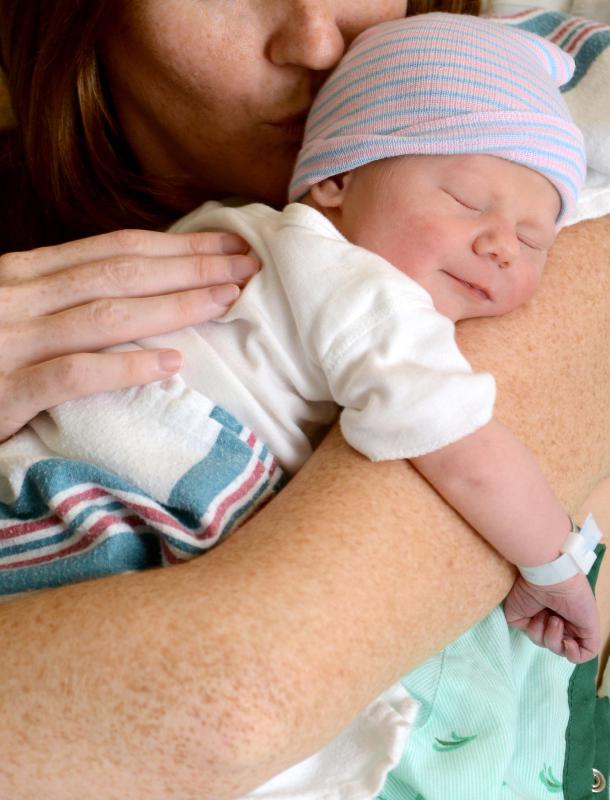At TheHealthBoard, we're committed to delivering accurate, trustworthy information. Our expert-authored content is rigorously fact-checked and sourced from credible authorities. Discover how we uphold the highest standards in providing you with reliable knowledge.
What is Trisomy 15?
Trisomy 15 is a genetic disorder caused by the presence of an extra third chromosome in developing diploid cells, which normally only contain two chromosomes. Possessing an extra chromosome leads to developmental disorders, anatomic defects, and sometimes death. There are various clinical syndromes that are trisomy disorders, but trisomy 15 is specifically caused by the additional chromosome being present in the 15th group of the 23 chromosomes that make up human deoxyribonucleic acid (DNA). Trisomy 15 is thought to be relatively rare, but it is difficult to ascertain how many babies would be born with the disorder because most fetuses that have the extra associated chromosome are miscarried in the first trimester. For pregnancies that progress to delivery, two forms of trisomy 15 syndrome are usually present in the children born: Prader-Willi syndrome (PWS) and Angelman syndrome (AS).
During normal conception, the fetus inherits one copy of each chromosome from both his mother and father. In trisomy syndromes, a process of uniparental disomy occurs, which is when two copies of one chromosome come from one parent. This extra chromosome becomes the third chromosome found in trisomy 15. When a child possesses an extra copy of his father’s chromosome, he develops AS, and if the chromosome is from his mother, he develops PWS. Miscarriage results if the fetus inherits double copies from both parents.

Infants born with Prader-Willi syndrome have trouble gaining weight and growing normally. From birth, babies with PS tend to have weak muscles, known as hypotonia, which make it hard to drink from a bottle. Sometimes feeding tubes or other special feeding techniques are used to make sure the baby receives adequate nutrition. As the child grows older, he usually exhibits multiple developmental delays and some develop a symptom unique to the PWS form of trisomy 15, hyperphagia. Hyperphagia is a condition that leads to excessive hunger and, in turn, obesity. If weight is managed and adequate support is established, it is reported that individuals with PWS can lead a fulfilling life.

Infants born with Angelman syndrome exhibit some of the same developmental delays as those with Prader-Willi. With AS, however, there are sometimes more symptoms present that are related to walking and balance. Many people with AS will need care throughout their lives in order to be ambulatory. As infants and toddlers, children with AS seem hyperactive and may seem uncomfortable in social situations. Research shows that with persistent therapy and behavior modification, these behaviors can be lessened or even eliminated.
AS FEATURED ON:
AS FEATURED ON:
















Discussion Comments
Full trisomy 15 (or you'll see just trisomy 15) is when all of the baby's cells have the extra copy of trisomy 15. In most cases, this tends to be a lethal condition.
Partial trisomy 15 is when only some of the baby's cells have the extra copy of chromosome 15. The severity of this condition ranges.
As in the article, Prader-Willi and Angelman Syndrome are not caused by having three copies of chromosome 15. Rather, sometimes babies start out by having three copies of chromosome 15 and then one is randomly removed. This is called a "rescue". Prader-Willi and Angelman Syndrome occur if the two chromosomes left are not one from mom, one from dad. Angelman is when there is two of dad's chromosomes, Prader-Willi when both chromosomes that are left are from mom.
You can detect trisomy 15 prior to birth by undergoing an amniocentesis or CVS. Talk to a genetic counselor if you need more information.
@ysmina-- I'm not an expert on genetics so I'm not one hundred percent sure. But I think that partial trisomy 15 is when there is one too many of a part of chromosome 15.
In regular trisomy 15, I think there is an extra whole chromosome 15. But in the partial one, it's only a certain segment of the chromosome that's extra.
But the syndrome caused by it is very similar to trisomy 15, and shows some of the same characteristics.
@ysmina-- I'm sure that's possible. I have heard of people doing genetic testing in the first two months of pregnancy if there is a risk of a genetic risk in their family. And you would have the option to terminate the pregnancy if it turns out that there is.
But a safer, and according to some, more ethical approach would be genetic testing before conception. The man and woman can both get genetic testing to see if there is anything abnormal. Genetic testing can also be done during in vitro fertilization to make sure that a healthy embryo implants in the womb.
Even though many people think that trisomy 15 happens based on chance, I don't think that's true. There are studies which showed that the sperm of fathers of children with Angelman syndrome carried multiple copies of genes which is more than likely the cause of the syndrome.
Of course people can't know if they carry this risk until something happens. But women who have trisomy 15 miscarriage should try again with assistance from medical professionals and with genetic testing during the process.
Is it possible for doctors to determine if a fetus has trisomy 15 before the baby is born?
And what is partial trisomy 15?
Post your comments